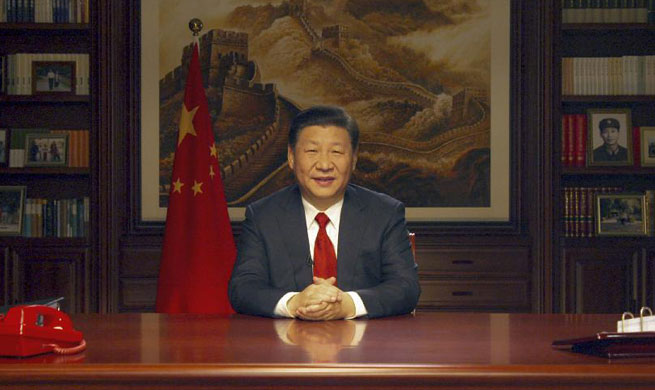DUBAI, Jan. 2 (Xinhua) -- The United Arab Emirates (UAE) has introduced for the first time a value-added tax (VAT) at a standard rate of 5 percent on goods and services since Jan. 1.
Nearly all goods and services are affected, from electricity bills to shopping baskets, with the exception of education, healthcare and some other services such as train and flight tickets.
For instance, the customers at the coffee shop will now have to pay 15.75 UAE dirhams for a cup of coffee latte instead of the previous 15 dirhams as written on the menu.
In order to narrow the deficit, the UAE has issued multi-billion-U.S.-dollar government bonds in recent years and implemented a 100-percent excise tax on tobacco products and energy drinks in October 2017.
"The UAE VAT rate of 5 percent is among the lowest in the world. In Egypt, it is 14 percent; in Lebanon it's 11 percent," Dubai-based economist Nasser Saidi, president of Nasser Saidi and Associates, told Xinhua in an e-mail.
Still, there are no taxes levied on personal or corporate incomes, but foreign banks have been paying 20 percent on their profits for over a decade.
As a major oil supplier, the UAE suffered from a slump in the price of oil from 110 dollars a barrel in mid-2014 to fewer than 26 dollars at the start of 2016.
While oil prices have recovered to more than 60 dollars a barrel thanks to an agreement of OPEC to limit output, the UAE's five-year budget surplus turned into a deficit in 2014 and the fiscal balance has been in the red since then.
Although school fees are not taxed, parents will have to pay VAT on school materials like pencils and writing pads as well as school uniforms and bus fares.
However, the UAE government's consumer protection department has urged people to report cases if they find shops exaggerate price increases in order to take advantage of VAT.
Business which register a turnover of above 100,000 dollars in the last 12 months will have to pay VAT on their services.
According to Saidi, there will be a dampening effect of VAT on growth because of the negative effect on consumption growth, but should be mild and could be offset by higher investment spending by government.
But not everybody shares Dr. Saidi's optimism. "Any increase in the transaction cost is never a good news for investors," Fathi Ben Grira, the CEO of stock brokerage company Menacorp, told Xinhua.
The Dubai Financial Market closed Tuesday trading 1.22 percent higher, boosted by insurance firms and real estate stocks.
"However," he added, "if we restrict the analysis to 2018, the VAT should not have a material negative impact on the UAE stockbrokerage industry: stocks valuation is relatively low and potential gains over the year can be important, which will more than offset the additional cost of the VAT for investors."
Ben Grira said "We anticipate better trading activity in 2018 than in 2017 despite the introduction of VAT."
According to Alex Chen, General Manager of the recently opened Chinese Business Hub in the emirate's newest free zone complex Dubai South, "the 5 percent VAT will not be a determining factor in most Chinese companies' decision to do business in Dubai or not, and their primary consideration continues to be how the market is for them."
The UAE is home to over 4,000 Chinese firms, while over 300,000 Chinese nationals live in the Gulf state whose government is a staunch supporter of China's Belt and Road Initiative.
The bilateral trade between China and the UAE reached a total of 170.2 billion dirhams (46.37 billion U.S. dollars) in 2016, which made China the UAE's biggest trade partner for the third consecutive year, according to UAE Ministry of Economy.
Chen added that "but as most Chinese companies in Dubai are trading firms whose revenue can easily exceed the threshold for VAT registration, the VAT's impacts for them are real."
For the Chinese businessman, the impacts are two-fold, namely in relation to "compliance costs, as many experts say that VAT is to be borne by end-users, but they ignore the fact that business owners need to hire tax experts to comply with all VAT regulations."
The Chinese Business Hub manager estimated "that for each Chinese company this cost is at least 18,000 dirhams (4,900 dollars) or above, which is a considerable amount for most Chinese small and medium enterprises."
What's more, he added, "is the psychological impact: many Chinese companies don't see Dubai as tax free any more. And they are afraid that more taxes will come or the VAT rate can be increased anytime in the future."
Chen said Dubai can introduce some investment incentive at the same time, so this concern can be alleviated.
For Dr. Saidi, the advantages of VAT dominate. For the UAE, VAT means an "improved sovereign credit rating because of improvement in fiscal prospects and reduced budget deficits."
The new tax also means "improved knowledge of economy (data and statistics from VAT returns) which could lead to improved policy made by government and businesses," he said.
The four other Gulf Arab states Kuwait, Bahrain, Qatar and Oman plan to levy the 5 percent VAT at a later stage in 2018 or 2019 which would complete a unified VAT scheme within the six member states comprising Gulf Cooperation Council (GCC).

















